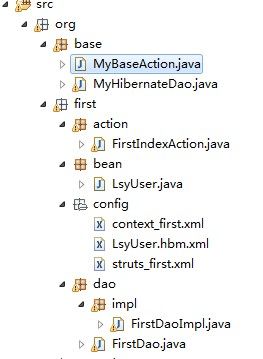java架构搭建(三)--测试模块编写
此篇继续上篇 http://blog.csdn.net/lushuaiyin/article/details/8588420
ssh已经整合完毕,现在做一个功能模块测试是否可用。
这个功能我们就叫first。
java代码结构图:
jsp路径结构图:
下面贴出代码:
FirstIndexAction
package org.first.action;
import java.io.PrintWriter;
import java.util.List;
import javax.servlet.http.HttpServletRequest;
import javax.servlet.http.HttpServletResponse;
import javax.servlet.http.HttpSession;
import org.apache.struts2.ServletActionContext;
import org.base.MyBaseAction;
import org.first.dao.FirstDao;
import com.opensymphony.xwork2.ActionContext;
public class FirstIndexAction extends MyBaseAction {
private static final long serialVersionUID = 1L;
public String execute() throws Exception{
return SUCCESS;
}
public String firstPage() throws Exception{
//继承了MyBaseAction,以下这些调用就简单很多
ActionContext ctx = ActionContext.getContext();
HttpServletResponse response = (HttpServletResponse) ctx.get(ServletActionContext.HTTP_RESPONSE);
HttpServletRequest request = (HttpServletRequest) ctx.get(ServletActionContext.HTTP_REQUEST);
HttpSession session = request.getSession();
response.setCharacterEncoding("UTF-8");
PrintWriter out = response.getWriter();
return SUCCESS;
}
public String queryUser() throws Exception{
String realName="";
if(this.getValueFromRequest("realName")!=null){
realName=(String)this.getValueFromRequest("realName");
}
List list=firstDao.queryUsers(realName);
this.setValueToRequest("userList", list);
return SUCCESS;
}
private FirstDao firstDao;
public FirstDao getFirstDao() {
return firstDao;
}
public void setFirstDao(FirstDao firstDao) {
this.firstDao = firstDao;
}
}
LsyUser
package org.first.bean;
public class LsyUser {
private String user_id;
private String user_name;
private String real_name;
public String getUser_id() {
return user_id;
}
public void setUser_id(String user_id) {
this.user_id = user_id;
}
public String getUser_name() {
return user_name;
}
public void setUser_name(String user_name) {
this.user_name = user_name;
}
public String getReal_name() {
return real_name;
}
public void setReal_name(String real_name) {
this.real_name = real_name;
}
}
context_first.xml
<?xml version="1.0" encoding="UTF-8"?>
<beans xmlns="http://www.springframework.org/schema/beans"
xmlns:xsi="http://www.w3.org/2001/XMLSchema-instance"
xmlns:aop="http://www.springframework.org/schema/aop"
xmlns:tx="http://www.springframework.org/schema/tx"
xsi:schemaLocation="
http://www.springframework.org/schema/beans http://www.springframework.org/schema/beans/spring-beans-2.0.xsd
http://www.springframework.org/schema/tx http://www.springframework.org/schema/tx/spring-tx-2.0.xsd
http://www.springframework.org/schema/aop http://www.springframework.org/schema/aop/spring-aop-2.0.xsd">
<bean id="firstDao" parent="transactionProxyTemplate">
<property name="target">
<bean class=" org.first.dao.impl.FirstDaoImpl">
<property name="sessionFactory">
<ref bean="sessionFactory"/>
</property>
</bean>
</property>
<property name="proxyInterfaces">
<value> org.first.dao.FirstDao</value>
</property>
</bean>
</beans>
<?xml version="1.0"?>
<!DOCTYPE hibernate-mapping PUBLIC
"-//Hibernate/Hibernate Mapping DTD 3.0//EN"
"http://hibernate.sourceforge.net/hibernate-mapping-3.0.dtd">
<hibernate-mapping>
<class name="org.first.bean.LsyUser" table="LSY_USER_DEVELOP" >
<id name="user_id" type="java.lang.String">
<column name="user_id" length="32" />
<generator class="assigned" />
</id>
<property name="user_name" type="java.lang.String">
<column name="user_name" length="32" />
</property>
<property name="real_name" type="java.lang.String">
<column name="real_name" length="32" />
</property>
</class>
</hibernate-mapping>数据库表我就不说了,就是很简单的3个字段,都是varcher类型。
struts_first.xml
<?xml version="1.0" encoding="UTF-8" ?> <!DOCTYPE struts PUBLIC "-//Apache Software Foundation//DTD Struts Configuration 2.0//EN" "http://struts.apache.org/dtds/struts-2.0.dtd"> <struts> <package name="first" extends="base-struts-default" namespace="/first"> <!-- 首页 --> <action name="firstPage" class="org.first.action.FirstIndexAction" method="firstPage"> <result name="success">/jsp/first/firstPage.jsp</result> </action> <action name="queryUser" class="org.first.action.FirstIndexAction" method="queryUser"> <result name="success">/jsp/first/listUser.jsp</result> </action> </package> </struts>
FirstDao
package org.first.dao;
import java.util.List;
public interface FirstDao {
public List queryUsers(String realName);
}
FirstDaoImpl
package org.first.dao.impl;
import java.util.List;
import org.base.MyHibernateDao;
import org.first.dao.FirstDao;
public class FirstDaoImpl extends MyHibernateDao implements FirstDao{
public List queryUsers(String realName){
List list=null;
if(realName==null||realName.trim().equals("")){
System.out.println("参数realName为空,查询所有值。");
String hql="select u from LsyUser u ";
list=this.queryListHql(hql);
}else{
String hql="select u from LsyUser u where u.real_name like '%"+realName.trim()+"%'";
list=this.queryListHql(hql);
}
return list;
}
}
index.jsp(项目首页)
<%@ page contentType="text/html; charset=UTF-8"%>
<%
String path = request.getContextPath();
%>
<html>
<head>
<meta http-equiv="Content-Type" content="text/html; charset=utf-8">
<title></title>
<script src="<%=path%>/script/jquery-1.7.1.min.js" type="text/javascript"></script>
</head>
<body style="overflow: scroll; overflow: auto;">
<input type="hidden" name="path" id="path" value='<%=path%>' ></input>
<center>
<h1>首页</h1>
</center>
<table width="500px" align="center">
<tr width="100%">
<td >账号:</td>
<td ><input type="text" value="" id="username"></input></td>
<td >密码:</td>
<td ><input type="text" value="" id="password"></input></td>
</tr>
<tr width="100%">
<td >查询用户:</td>
<td ><input type="radio" checked value="1" name="logintype"></input></td>
<td >查询部门:</td>
<td ><input type="radio" value="2" name="logintype"></input></td>
</tr>
<tr width="100%">
<td ></td>
<td ><input type="button" value="登录" onclick="login()"></input></td>
<td ></td>
<td ><input type="button" value="重置" onclick="resetValue()"></input></td>
</tr>
</table>
</body>
</html>
<script type="text/javascript">
//简单的登录
function login(){
var username=document.getElementById("username").value;
var password=document.getElementById("password").value;
if(username!=null&&username!=""){
var urlpath="<%=path%>"+"/jsp/first/firstPage.jsp?randomStr="+Math.random();
var urlpath2="<%=path%>"+"/jsp/second/secondPage.jsp?randomStr="+Math.random();
var type=getRadioGroupValue();
if(type=="2"){
window.location.href=urlpath2;
}else{
window.location.href=urlpath;
}
}else{
alert("账号密码不正确!");
}
}
function resetValue(){
document.getElementById("username").value="";
document.getElementById("password").value="";
}
//js获取单选按钮组的值
function getRadioGroupValue(){
var result="";
var logintype=document.getElementsByName("logintype");
if(logintype!=null&&(typeof logintype !="undifined")){
for(i=0;i<logintype.length;i++){
if(logintype[i].checked){
result=logintype[i].value;
}
}
}
return result;
}
</script>
firstPage.jsp
<%@ page contentType="text/html; charset=UTF-8"%>
<%
String path = request.getContextPath();
%>
<html>
<head>
<meta http-equiv="Content-Type" content="text/html; charset=utf-8">
<title></title>
<script src="<%=path%>/script/jquery-1.7.1.min.js" type="text/javascript"></script>
</head>
<body style="overflow: scroll; overflow: auto;">
<input type="hidden" name="path" id="path" value='<%=path%>' ></input>
<center><h1>查询用户</h1></center>
<table width="500px" border="1" align="center">
<tr>
<td>姓名:<input type="text" id="realName" value='' ></input></td>
</tr>
<tr>
<td><h1><a href="javascript:void(0)" onclick="chaxun()">查询</a></h1></td>
</tr>
</table>
</body>
</html>
<script type="text/javascript">
//查询列表
function chaxun(){
var realName=document.getElementById("realName").value;
var urlpath="<%=path%>/first/queryUser.action?randomStr="+Math.random()+"&realName="+realName;
window.location.href=urlpath;
}
</script>
listUser.jsp
<%@ page contentType="text/html; charset=UTF-8"%>
<%@page import="java.util.*"%>
<%@page import=" org.first.bean.LsyUser"%>
<%
String path = request.getContextPath();
%>
<%
List list=null;
if(request.getAttribute("userList")!=null){
list=(List)request.getAttribute("userList");
}
%>
<html>
<head>
<meta http-equiv="Content-Type" content="text/html; charset=utf-8">
<title></title>
<script src="<%=path%>/script/jquery-1.7.1.min.js" type="text/javascript"></script>
</head>
<body style="overflow: scroll; overflow: auto;">
<input type="hidden" name="path" id="path" value='<%=path%>' ></input>
<table width="500px" border="1" align="center">
<tr>
<td align="center">姓名:<input type="text" id="realName" value='' ></input></td>
</tr>
<tr>
<td align="center"><h1><a href="javascript:void(0)" onclick="queryuser()">查询</a></h1></td>
</tr>
</table>
<table width="500px" border="1" align="center">
<tr>
<th align="center">姓名</th><th align="center">账号</th>
</tr>
<%
if(list!=null){
for(int i=0;i<list.size();i++){
LsyUser user=(LsyUser)list.get(i);
if(user!=null){
String realname="";
String user_name="";
if(user.getReal_name()!=null){
realname=user.getReal_name();
}
if(user.getUser_name()!=null){
user_name=user.getUser_name();
}
%>
<tr>
<td><%=realname%></td><td><%=user_name%></td>
</tr>
<%
}
}
}
%>
</table>
</body>
</html>
<script type="text/javascript">
function queryuser(){
var urlpath="<%=path%>"+"/first/queryUser.action";
var realName=document.getElementById("realName").value;
$.ajax({
type:"POST",
url:urlpath,
data: "realName="+realName+"&randomStr="+Math.random(),
success: function(msg){
alert( "Succeed:");
window.location.reload();
}
});
}
</script>
此功能我已经测试过,能正常使用。代码就不讲解了,就是很简单的一个查询。目的只是为了测试ssh的整合是否成功。
Hibernate这个框架的好处就是帮我们处理持久层的东西。
如果我想把数据库从orcle移植到mysql,利用hibernate就很简单。
步骤:
1:修改对sessionFactory的配置。
因为属性的值都放到properties中了,所以我只需要修改configure.properties,如下:
# applicationContext.xml ### C3P0 Connection Pool c3p0.maxPoolSize=3 c3p0.minPoolSize=1 c3p0.maxIdleTime=1800 c3p0.maxStatements=0 c3p0.acquireIncrement=2 c3p0.idleConnectionTestPeriod=600 #oracle #jdbc.driverClassName=oracle.jdbc.driver.OracleDriver #jdbc.url=jdbc:oracle:thin:@10.55.15.66:1521:cdbank #jdbc.username=ccdb #jdbc.password=ccdb #hibernate.dialect=org.hibernate.dialect.Oracle9Dialect #mysql jdbc.driverClassName=com.mysql.jdbc.Driver jdbc.url=jdbc:mysql://127.0.0.1:3306/mydb jdbc.username=root jdbc.password=root hibernate.dialect=org.hibernate.dialect.MySQLInnoDBDialect
2:记得添加驱动包mysql-connector-java-5.1.13-bin.jar,并引入classpath。
3:创建对应的数据库和表。
这里我想说的是Hibernate中的一个属性<prop key="hibernate.hbm2ddl.auto">update</prop>
这个hibernate.hbm2ddl.auto有一下几个值:
validate 加载hibernate时,验证创建数据库表结构 create 每次加载hibernate,重新创建数据库表结构,这就是导致数据库表数据丢失的原因。 create-drop 加载hibernate时创建,退出是删除表结构 update 加载hibernate自动更新数据库结构在此如果我们在移植数据库时(当然只是开发过程,不关心数据的情况下),我们可以配置这个属性帮我们创建表。
等完成后一定要把此属性删掉。为什么呢?因为数据库时很重要的,所以很多大公司才高新聘请DBA,这种用程序操作
数据库本身就很危险。在你对hibernate源码都没怎么看的情况下,这种方式就不自量力了。
下一篇我们要将代码中一个比较重要的内容,那就是spring事务的使用。这里已经用到了,只是内容太多,放到下篇再细说吧。

